1 May 2025 | Americas, News, Venezuela
This article first appeared in Volume 54, Issue 1 of our print edition of Index on Censorship, titled The forgotten patients: Lost voices in the global healthcare system, published on 11 April 2025. Read more about the issue here.
When lawyer Perkins Rocha was seized by forces while leaving a pharmacy in Caracas on 27 August 2024, his family found out he had been taken only when they saw a post on social media platform X.
A frantic investigation began to find out where Rocha, the legal co-ordinator for Venezuela’s election campaign for the political opposition, was being held – and to speak to those who had seen what had happened.
“Witnesses told us that hooded men approached him and a strong struggle began. They hit him and dragged him to one of the unmarked vehicles they were in, and took him away,” his son Santiago told Index. The family haven’t seen or heard from him since.
The highest number of political prisoners in Latin America
Rocha’s case is far from an isolated one. According to human rights organisation Foro Penal, Venezuela had 1,196 political prisoners as of 3 February 2025. The country has the most political prisoners in Latin America – followed by Cuba with 1,150 – and has a history of using repression and arbitrary detentions as a means of silencing and punishing those with anti-government views.
This pattern has intensified following the July 2024 presidential election, which incumbent Nicolás Maduro insisted he won despite evidence from voting tally receipts showing opposition candidate Edmundo González Urrutia won by a landslide with 67% of the vote.
Protests demanding that the state acknowledge the opposition’s legitimate win followed, and with them a swathe of arrests and detentions during random street searches by police looking for content on people’s phones that criticised the government. Others were detained during Operation Knock Knock, where security forces arrived at people’s houses (often late at night) to arrest them and take them to prison.
Arbitrary detentions designed to force dissenters to stay silent started well before last year’s election. But according to human rights group The Venezuelan Education-Action Programme on Human Rights (Provea), the sheer number of arrests in a short space of time during the 2024 crackdown was on a different level from previous years. Between 29 July and 13 August, roughly 2,400 people were arrested, which is an average of 150 arrests a day.
It is not only the scale of detentions that highlights the intensified repression but also the charges against those being held. According to Marino Alvarado, legal action co-ordinator at Provea, all the prisoners were initially charged with terrorism, including children and teenagers. Maduro referred to those detained as “terrorists” in a televised address.
“In some cases, in addition to the crime of terrorism, [they were charged with] treason, criminal association and other crimes, but all were tried by anti- terrorism courts,” Alvarado told Index. Legal representation is also unsatisfactory, with public lawyers being “imposed” on political prisoners rather than them having the option to choose a “trusted, private lawyer”. “In addition to having a lot of work, public lawyers receive direct orders from the state, and detained people are left without the right to a defence,” said Alvarado.
Dire conditions within prisons
Conditions within prisons are notoriously grim. Some do not permit visits from families, but others allow them every 15 days – although sometimes these are cancelled by the authorities. When people do see their loved ones, it is often a heart- wrenching experience. “I noticed he was shaky and nervous and I asked him what was wrong,” said Maritza, whose name has been changed for her own safety and for that of her son, who was detained a few days after the July 2024 protests. She described him as a young man who was normally calm and confident.
“Eventually he said to me, ‘Mum, when I get out of here I’m going to tell you everything I’ve been through, but while I’m here I’m going to keep quiet and endure what I’m living [through] because I don’t want to anger [the authorities].’” A report from the Committee for the Freedom of Political Prisoners (CLIPPVE) highlighted that food rations inside the prisons were often tiny and insufficient, sometimes contained insects and were rotten or not sufficiently cooked. The information is based on testimonies from families of those in jail, as well as ex-prisoners. Many of the prisoners have lost weight and have experienced stomach illnesses. One woman whose son has been held in Tocuyito Prison said she couldn’t even recognise him when she saw him. “He was so thin and malnourished that I had him in front of me and I wouldn’t know it was him,” she said.
In November and December, three political prisoners died. One of them, Jesús Manuel Martínez Medina, was detained on 29 July and allegedly mistreated and denied the necessary medical care to treat his Type II diabetes, according to CLIPPVE. The NGO says the 36-year-old’s health deteriorated rapidly due to lack of treatment. Although he was transferred to hospital, he died on 14 November during an operation to amputate his legs.
Medical attention is severely lacking in the prisons. Santiago Rocha said he was constantly worried about the health of his father, who suffers from hydrocephalus – a build-up of fluid in the brain. He has a fitted valve connected from his brain to his stomach to drain the fluid.
“We always have this fear that no one is watching him, no one is checking on him. Any blow or movement that is abrupt could alter the functioning of that valve and the hose,” the 30-year-old said. He eventually discovered his father had been taken to el Helicoide, a notorious jail known for holding political prisoners and for its use of torture. “We don’t know if my dad has seen the sun in days, weeks or months, if he has eaten well or if they have tortured him,” he added.
Erosion of a democratic state
Some of those taken have been tortured. One of those is Jesús Armas, an engineer, human rights activist and member of the opposition campaign team, who was taken by hooded individuals on 10 December 2024 while leaving a restaurant in Caracas and whose whereabouts were not known for days. “His girlfriend managed to see him for 15 minutes before he was transferred to el Helicoide prison. He told her he had been held in a clandestine house, suffocated with a bag and left tied to a chair for several days,” said Genesis Davila, a lawyer and founder of Defiende Venezuela, an organisation that presents human rights violations in Venezuela to international legal institutions.
As is the case with many political prisoners, public prosecutors, judges and defence lawyers denied knowing about Armas’s detention for days. “But while they said this, Jesús had already been presented before a court, there was already a prosecutor who knew the case and there was also a public defender who had been assigned to [his]’ case,” Davila said.
Repression has intensified under the socialist regime. When Hugo Chávez first took office in 1999, he did so on a wave of popular support and spent huge amounts on social programmes such as adult literacy projects and free community healthcare for impoverished communities, largely funded by the country’s oil wealth.
But alongside this he started to concentrate power, taking control of the Supreme Court and undermining the ability of journalists, human rights defenders and other Venezuelans to exercise fundamental rights, according to a Human Rights Watch report that reflected on his legacy.
Maduro took over the presidency when Hugo Chávez died of cancer in 2013. A drop in oil prices, mismanagement of resources and corruption led to a dire economic and humanitarian crisis (exacerbated by US sanctions, according to many analysts). Brutal state crackdowns on anti- government protests in 2014, 2017 and 2019 led to deaths and mass detentions. For Phil Gunson, a senior analyst at the think-tank International Crisis Group, repression has worsened significantly in Venezuela since 1999. The less popular the government became, the more it used repression to stay in power, which became even clearer in its use of heavy-handed tactics in the 2024 protests.
“The government is entirely dependent on the army and the police,” said Gunson. “That doesn’t just mean harassing and detaining dissidents but treating them so badly that no one dares to protest.” The analyst says impunity is another reason for rising repression. “Venezuelans have no recourse if they suffer abuse at the hands of the government, and members of the security forces can be fairly certain there will be no consequences if they commit human rights abuses.”
For those with families in prison, their daily nightmare is unbearable – yet they say giving up hope for their loved ones’ release and a free Venezuela is not an option. “I try to keep him in mind as I go about my day-to-day life, asking myself what he would want me to do at this moment,” Santiago Rocha said, describing his dad as a loving father and a man with strong ideals. “I keep him like this so I don’t feel far away from him and remember that all the work he – and the people who have worked with him – have done will not be in vain.
11 Jul 2024 | Azerbaijan, Europe and Central Asia, News
Last month, Ibad Bayramov – son of renowned economist and activist Dr Gubad Ibadoghlu – received a letter from a cardiologist based in the USA warning of an “imminent threat” to his father’s life.
“The cardiologist has recommended that my father has an aortic root aneurysm and must go under surgery as soon as possible,” Bayramov told Index. “The government falsified his medical results during the communications with the ECHR.”
This is just the latest development in the tragic case of the 52-year-old academic Ibadoghlu, who was arbitrarily detained alongside his wife in July 2023 on fabricated charges of producing, acquiring or selling counterfeit money.
The move has been widely condemned as a political one by the Azerbaijani government because of Ibadoghlu’s long history of environmental activism and criticism of the state. Although his wife, Irada Bayramova, was later released, Ibadoghlu still faces charges and is now under house arrest. It means he can’t leave the country to get the medical help he needs.
His son described the harrowing ordeal to Index.
“My parents were brutally physically assaulted and psychologically abused by Azerbaijani police,” he explained. “Our mother had to be hospitalised as a result of the stress she had been going through due to police violence she faced when she was detained.”
Bayramov is one of Ibadoghlu’s three children, all of whom are fighting for their father’s release. He told Index of another man, economist Fazil Gasimov, who had been arrested in the same case and subjected to torture until he testified against Ibadoghlu.
“He was forced to provide false testimony under severe duress, including electroshock torture and having his head submerged in a toilet,” said Bayramov.
“His government-appointed lawyer colluded with the authorities to extract these false statements.”
According to his brother, Gasimov went on a hunger strike in June in protest of the investigation against him and Ibadoghlu.
If convicted of his trumped-up charges, Ibadoghlu – who has had his pre-trial detention extended on three occasions – could face up to 17 years in prison. This would be a shocking miscarriage of justice towards a man who has spent his life fighting for environmental rights and democracy.
Since receiving his PhD in economics from Azerbaijan State University of Economics in 2000, Ibadoghlu has conducted a wide range of research, looking into corruption and money laundering in Azerbaijan as well as petro-authoritarianism and how being oil-rich impedes democracy in post-Soviet nations.
He has previously worked in a number of world-class universities, including Duke University in California and the London School of Economics, and has garnered huge respect in the academic world. A number of academics – alongside several human rights and environmental groups – signed a letter calling for his release which was sent to then-Secretary of State David Cameron in April.
Ibadoghlu’s condition becomes more critical with each passing day. His health, which already had its issues prior to his arrest, has rapidly declined. He has lost 15kg during his time in detention and requires extensive care and possible surgery which Bayramov says is beyond the capabilities of Azerbaijan’s medical system.
“We will try to transfer him to the foreign hospital as soon as possible. However, due to the travel ban he can’t leave the country to get medical assistance,” he said.
Ibadoghlu is currently under house arrest having been moved from detention on 22 April, which his son said is due to pressure on the government over his health.
While under house arrest, Ibadoghlu is prohibited from leaving home between 10pm and 6am or from leaving the capital city of Baku at all. The authorities have to be able to contact him at all times and he has no national ID, therefore cannot register at a hospital.
His trial is currently due on 20 August, but as this date has been pushed back before, Ibadoghlu’s family are wary of getting their hopes up that this saga could end sometime soon.
This is just one of many accusations faced by the Azerbaijan government of violating the human rights of dissenters. On 3 July, the Council of Europe’s Committee for the Prevention of Torture and Inhuman or Degrading Treatment or Punishment (CPT) issued a public statement detailing the refusal of the Azerbaijani authorities to co-operate with them.
In the statement, the CPT said that it “continues to receive allegations of severe acts of ill-treatment and even of torture by police officers” in the state. Such an extraordinary step demonstrates just how alarming the free speech environment in Azerbaijan has become.
The situation Ibadoghlu faces is outrageous but sadly all too common. There is no basis for his arrest, which has been made for purely political reasons. His detainment is a serious miscarriage of justice and an affront to free speech. Given his waning health, his release can’t come a moment too soon.
13 Oct 2014 | Azerbaijan, Azerbaijan News, Europe and Central Asia, News
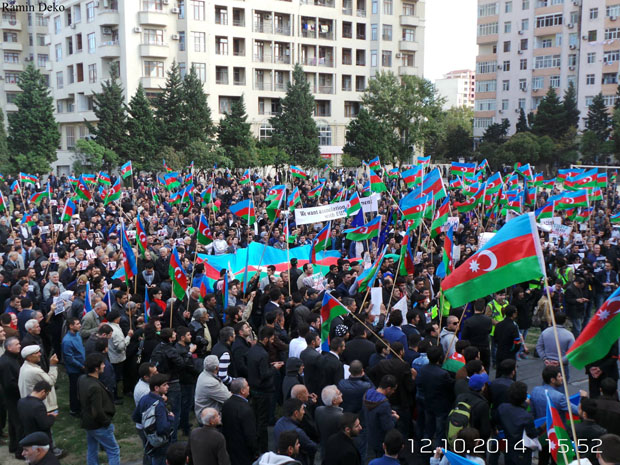
Thousands of Azerbaijanis took to the street on Sunday, calling for the resignation of President Ilham Aliyev, the release of political prisoners and an end to human rights abuses in the country. The protest comes during an ongoing and wide reaching crackdown on regime critics.
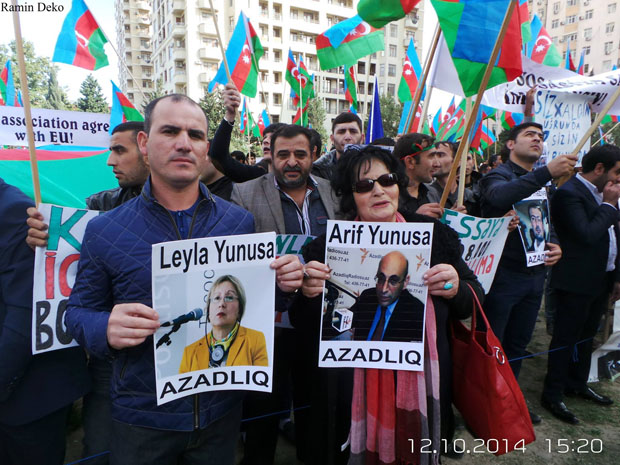
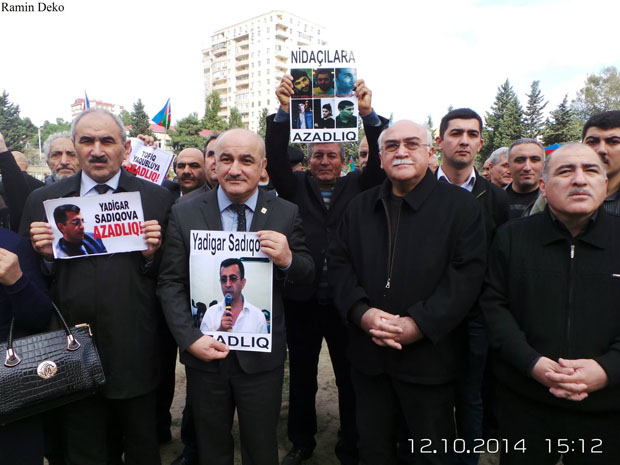
On Saturday, investigative journalist Khadija Ismayilova was placed under a travel ban. The award-winning reporter has covered corruption allegedly connected to Aliyev, and has been targeted by government supporters in the past. She is currently facing criminal charges of libel and document forgery, which she denies and vows to fight.
Last week, Index reported journalist Arzu Geybulla being threatened on social media and accused of treason after being interviewed by Azerbaijani news site Modern.az.
These cases follow the jailing of several prominent and critical voices within Azerbaijan’s civil society. Human rights defender Leyla Yunus and her husband Arif were detained in July, followed by fellow rights activist Rasul Jafarov, lawyer Intigam Aliyev and journalist Seymur Hezi.
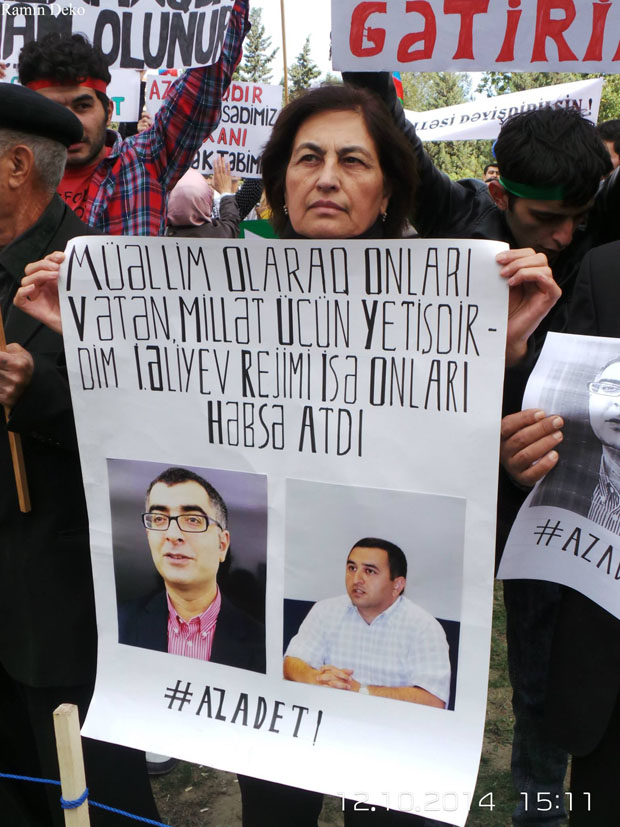
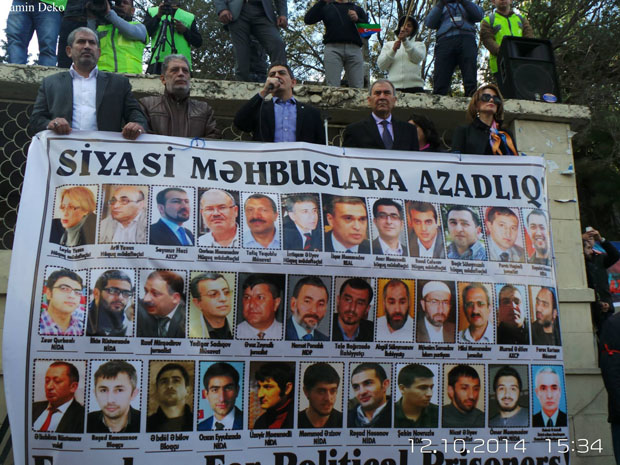
The European Parliament recently called on Azerbaijan — currently chairing the Council of Europe — to release several prominent political prisoners and proceed with reforming the country’s human rights policies. Before being arrested, Jafarov had worked on putting together a detailed list of the country’s political prisoners, with the latest figure coming to 98.
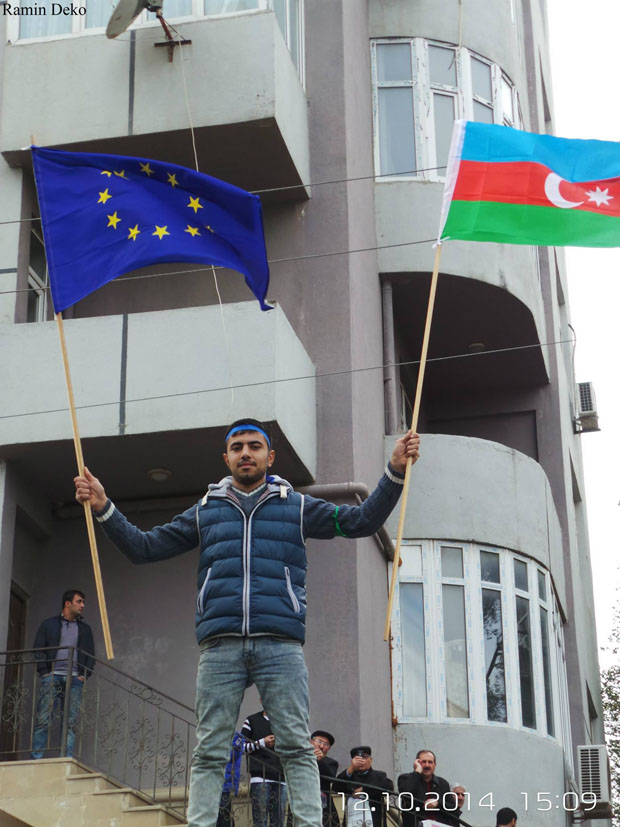
The protest, which also called for closer ties to the European Union, was approved by authorities, but took place in a remote part of Baku.
All photos by Ramin Deko
This article was posted on 10 October 2014 at indexoncensorship.org
10 Oct 2014 | Azerbaijan, Azerbaijan News, News
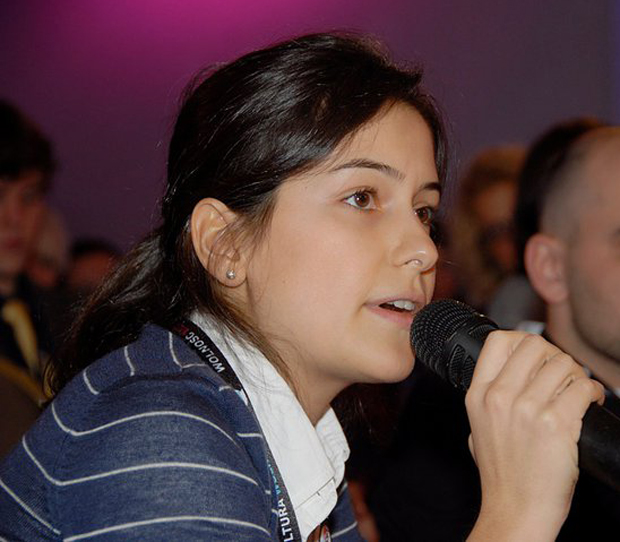
Arzu Geybulla
Journalist Arzu Geybulla has received a growing number of threats on social media following an interview with Azerbaijani news site modern.az.
Geybulla has been subject to ongoing intimidation because of her work at Istanbul-based Armenian paper, Agos. The interview has led to Geybulla being accused of treason by the Azerbaijani media.
Despite calls from the European Parliament in September, Azerbaijan has still failed to release prominent political prisoners Leyla and Arif Yunus, Rasul Jafarov, Intigam Aliyev and Hasan Huseynli.
Jodie Ginsberg, CEO of Index on Censorship, said: “Azerbaijan portrays itself internationally as a country that values human rights and respects the freedom of its citizens to express themselves. In reality, anyone who seeks to speak or act freely in Azerbaijan is targeted, imprisoned and harassed. The international community needs to take a far tougher stance on Azerbaijan to help defend individuals like Arzu and the defenceless individuals to which her work gives voice.”
Geybulla wrote for Index on Censorship about her thoughts on free expression in Azerbaijan on July 30, the day Leyla Yunus was detained.
Leyla and her husband have now been imprisoned for 73 days. Javarov has been in prison for 70 days since August 2, and Aliyev has been detained for 64 days, since August 8. Huseynli, who has been detained for 195 days since March 30, is serving a six year sentence.
Take action to support Arzu Geybulla, Leyla and Arif Yunus, Rasul Jafarov, Intigam Aliyev and Hasan Huseynli.
Post on Twitter, Facebook, Reddit or share with your friends. Let @PresidentAZ know you ware watching.
Please send appeals immediately:
— Condemning the campaign of intimidation directed at Arzu Geybullayeva for her legitimate work as a journalist at Agos;
— Calling on the Turkish and Azerbaijani authorities to investigate any threats of violence against her and to ensure her safety;
— Reminding them that they have the obligation to safeguard Geybullayeva’s right to freedom of expression under the European Convention on Human Rights (ECHR) and the International Covenant on Civil and Political Rights (ICCPR), to which they are both state parties.
Appeals to:
Mr Ramil Usubov
Minister of Internal Affairs for the Republic of Azerbaijan
7 Husu Haliyev Street
Baku, Azerbaijan
AZ1001
Email: [email protected]
Twitter: @PresidentAZ
Mr Efkan Ala
Minister of Interior for the Republic of Turkey
T.C. İçişleri Bakanlığı
Bakanlıklar
Ankara, Turkey
Email: [email protected]; [email protected]
Twitter: @efkanala
If possible, please copy appeals to the diplomatic representative for Azerbaijan and Turkey in your country. Let us know of any actions you have taken and responses you receive.
This article was posted on 10 October 2014 at indexoncensorship.org







